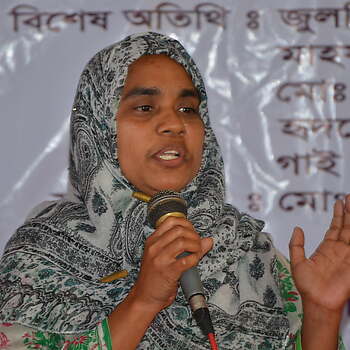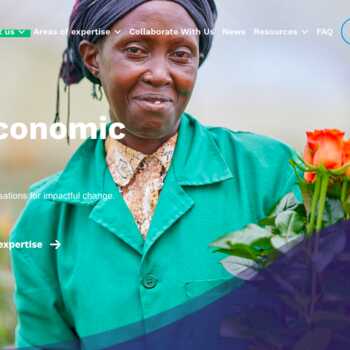Enhancing women’s Voice and Agency – why and how
Over the years it became evident that WEE not only requires enhancing women’s access to economic resources and opportunities, but also their voice and agency in the economic domain. Voice refers to the ability to have a say in decision-making, and agency to the ability to make strategic choices and act upon them. Voice implies that women set the agenda for their own change, as in the slogan ‘Nothing about us without us’.
Enabling women to have an equal voice and equal role in decision making in societies, organizations and households is perhaps the most significant and the most difficult part of the gender equality agenda. Policies and activities are needed to change social norms, laws, and legal institutions. Engaging men and boys as key change agents is needed, especially in dismantling negative social norms and habits, and in redistributing unpaid work.
Investing in education is key to enhancing voice and agency. With even a few years of primary education, women have better economic prospects, fewer and healthier children, and better chances of sending their children to school. If girls’ education continues to secondary level, they will be better equipped to make informed choices about their lives (OECD/DAC).
Training and capacity building have long been recognized as essential in women’s development. Training and capacity building should not be limited to technical and business topics, but also include soft skills such as self-confidence, speaking out in public, organizing and leadership.
Organizing women has long been recognized as a way to enhance women’s voice and agency, as a way to leverage the power of numbers. Organizing for WEE has taken many forms: informal savings groups, self-help groups, trade unions, business associations, chambers of commerce, cooperatives and women’s organizations. Organizing women is more effective in enhancing voice and agency if organizations speak out for women’s interests, beyond their technical activities.
Especially women’s groups and their collective action play a pivotal role in building momentum for progressive reform. Strong women’s movements are needed to drive transformational change for women. Feminist organizations and movements take up activism for transformational change.
During the 1970s and 1980s the awareness about the ‘domestication of women’ (as described by Barbara Rogers, see bullet 3) increased, also in developing countries. In response, women’s organizations emerged that challenged the oppression of women. In 1982 AWID (Association for Women’s rights in Development) was established, and it has since developed into a global network of feminist organizations to support feminist movements. An early example in the Netherlands is Mama Cash, created in 1983 by five feminists. It became the first international women’s fund in the world, supporting women’s, girls’, trans and intersex people’s movements, and is still very active.
During the years 2000 it became clear to the world that MDG3 on Gender Equality and Empowering Women was not on track. Awareness grew that this was due to insufficient attention to the voice of the women and the need for systems change. The World Bank took up this theme in its 2012 World Development Report that had ‘Gender Equality and Development’ as its special topic. The title of its 2014 gender strategy was Voice and Agency. The increasing emphasis on the empowerment of women, with its connotation of women having the power to act, also enhanced the importance of Voice and Agency.
Dutch support to women’s Voice and Agency
Training and capacity building have always been important elements of gender projects and gender mainstreaming in Dutch development cooperation.
However, in the period 1970 – 2000, when gender projects and gender mainstreaming were less common, training and capacity building were mainly technical and not geared to enhancing women’s voice and agency. Some training even only confirmed women’s traditional, subordinate roles in household and community. Moreover, efforts were often limited to building the capacities of women, but without tackling the structural impediments for women in their environment (‘fixing the women’ rather than ‘fixing the system’).
This started to change by 2008. The women’s movement grasped the opportunity, offered by Minister Koenders’ public consultations, to press for a stand-alone budget for women’s projects empowering local women and local women’s organizations. The agenda for projects to be funded from this budget was to be set by the women’s organizations themselves. The MDG3 Fund (2008-2011, see bullet 4) and its successor funds FLOW 1 and 2 (2012-2020) and Power of Women (2021-2025) were based on this principle by funding mainly intermediary (I)NGOs that worked directly with local women and/or local women’s organizations.
In the domain of WEE, a few small, but innovative, stand-alone gender projects sought to enhance the voice of women’s organizations in the business sector. The projects’ results showed that such efforts are best undertaken through a value chain approach (see bullet 12). In the first project, AWID and Mama Cash asked minister Ploumen in 2014, to support their efforts to initiate partnerships with international companies. A conference brought representatives of women’s organizations and companies together with academics in The Hague. It led eventually to the project Building Bridges for Women’s Economic Empowerment (BBWEE), and was implemented by Women Win (2019-2023). The project works mostly in Kenya on advancing women’s economic rights and resilience in floriculture, tea and other supply chains. The mid-term evaluation concluded that the implementation of the BBWEE project had benefited businesses and workers, including women.
In the second project, MFA cooperated with the global business network Business for Social Responsibility (BSR) in the project ‘Private Sector Action for Women’s Empowerment’ (2016-2019). The project findings fitted well in the BSR’s ongoing work in global supply chains (see BSR HER project).
In the Dutch gender mainstreaming policies, the emphasis on Voice and Agency led to the principle that women affected by project activities, were to be consulted at every stage of an activity, and be given the opportunity to co-decide on decisions that affected them



